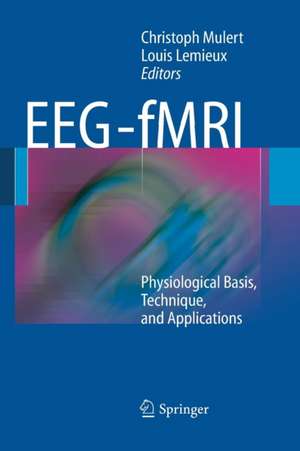EEG - fMRI: Physiological Basis, Technique, and Applications
Editat de Christoph Mulert, Louis Lemieuxen Limba Engleză Paperback – 23 aug 2016
The proposed book will discuss in detail the physiological principles, practical aspects of measurement, artefact reduction and analysis and also applications of the integration of fMRI and EEG. All applications, which are mainly in the fields of sleep research, cognitive neuroscience and clinical use in neurology and psychiatry will be reviewed.
| Toate formatele și edițiile | Preț | Express |
|---|---|---|
| Paperback (2) | 793.42 lei 6-8 săpt. | |
| Springer Berlin, Heidelberg – 23 aug 2016 | 793.42 lei 6-8 săpt. | |
| Springer International Publishing – 3 ian 2024 | 932.42 lei 6-8 săpt. | |
| Hardback (1) | 1216.36 lei 38-44 zile | |
| Springer International Publishing – 2 ian 2023 | 1216.36 lei 38-44 zile |
Preț: 793.42 lei
Preț vechi: 835.18 lei
-5% Nou
Puncte Express: 1190
Preț estimativ în valută:
151.84€ • 156.86$ • 126.37£
151.84€ • 156.86$ • 126.37£
Carte tipărită la comandă
Livrare economică 26 martie-09 aprilie
Preluare comenzi: 021 569.72.76
Specificații
ISBN-13: 9783662501504
ISBN-10: 3662501503
Pagini: 539
Ilustrații: XXIII, 539 p.
Dimensiuni: 155 x 235 mm
Greutate: 0.78 kg
Ediția:2010
Editura: Springer Berlin, Heidelberg
Colecția Springer
Locul publicării:Berlin, Heidelberg, Germany
ISBN-10: 3662501503
Pagini: 539
Ilustrații: XXIII, 539 p.
Dimensiuni: 155 x 235 mm
Greutate: 0.78 kg
Ediția:2010
Editura: Springer Berlin, Heidelberg
Colecția Springer
Locul publicării:Berlin, Heidelberg, Germany
Cuprins
Background.- Principles of Multimodal Functional Imaging and Data Integration.- EEG: Origin and Measurement.- The Basics of Functional Magnetic Resonance Imaging.- Locally Measured Neuronal Correlates of Functional MRI Signals.- What Can fMRI Add to the ERP Story?.- The Added Value of EEG–fMRI in Imaging Neuroscience.- Technical and Methodological Aspects of Combined EEG-fMRI Experiments.- EEG Instrumentation and Safety.- EEG Quality: Origin and Reduction of the EEG Cardiac-Related Artefact.- EEG Quality:The Image Acquisition Artefact.- Image Quality Issues.- Specific Issues Related to EEG-fMRI at B 0 > 3 T.- Experimental Design and Data Analysis Strategies.- Applications of EEG-fMRI.- Brain Rhythms.- Sleep.- EEG–fMRI in Adults with Focal Epilepsy.- EEG–fMRI in Idiopathic Generalised Epilepsy (Adults).- EEG–fMRI in Children with Epilepsy.- Combining EEG and fMRI in Pain Research.- Simultaneous EEG and fMRI of the Human Auditory System.- Visual System.- Cognition.- Neuronal Models for EEG–fMRI Integration.- BOLD Response and EEG Gamma Oscillations.- EEG–fMRI in Animal Models.- EEG–fMRI Information Fusion: Biophysics and Data Analysis.
Recenzii
From the reviews:“The editors have gathered an excellent group of authors to contribute highly technical and up-to-date chapters on the highly specialized technique of EEG-fMRI. … This book will be helpful to readers interested in the technique and in cognitive neurosciences. It will be useful for anyone interested in learning more about this technique and can easily be used by all levels of learners or practitioners. … I would recommend it to interested readers.” (Joseph F. Drazkowski, Doody’s Review Service, March, 2010)
Textul de pe ultima copertă
Functional magnetic resonance imaging (fMRI) and electroencephalography (EEG) are very important and complementary modalities since fMRI offers high spatial resolution while EEG provides a direct measurement of neuronal activity with high temporal resolution. Interest in the integration of these two types of data is growing rapidly as it promises to yield important new insights into human brain activity, as has already occurred in the case of epilepsy. Indeed, it seems certain that integrated EEG-fMRI will play an increasing role in neuroscience and in the clinical study of various brain disorders. This book discusses in depth all aspects of EEG-fMRI, including physiological principles and technical and methodological issues such as EEG artefact reduction methods, image quality, and data analysis strategies. Detailed consideration is given to all potential applications, primarily in the fields of sleep research, cognitive neuroscience, and clinical neurology and psychiatry. All of the authors are recognized experts in the field, and the text is supported by numerous informative illustrations.
Caracteristici
First book covering the aspects of the integration of EEG and fMRI Discussion of the physiological principles, practical aspects of measurement, artefact reduction and analysis All applications mainly in the field of epilepsy sleep research, cognitive neuroscience and clinical use in neurology and psychiatry will be reviewed First time that electrophysiological and haemodynamic characteristics of the brain can be measured at the same time Includes supplementary material: sn.pub/extras
Notă biografică
Prof. Dr. med Christoph Mulert, Justus-Liebig-University Giessen, Centre for Psychiatry and Psychotherapy
Prof. Dr. Louis Lemieux, University College London, Institute of Neurology
